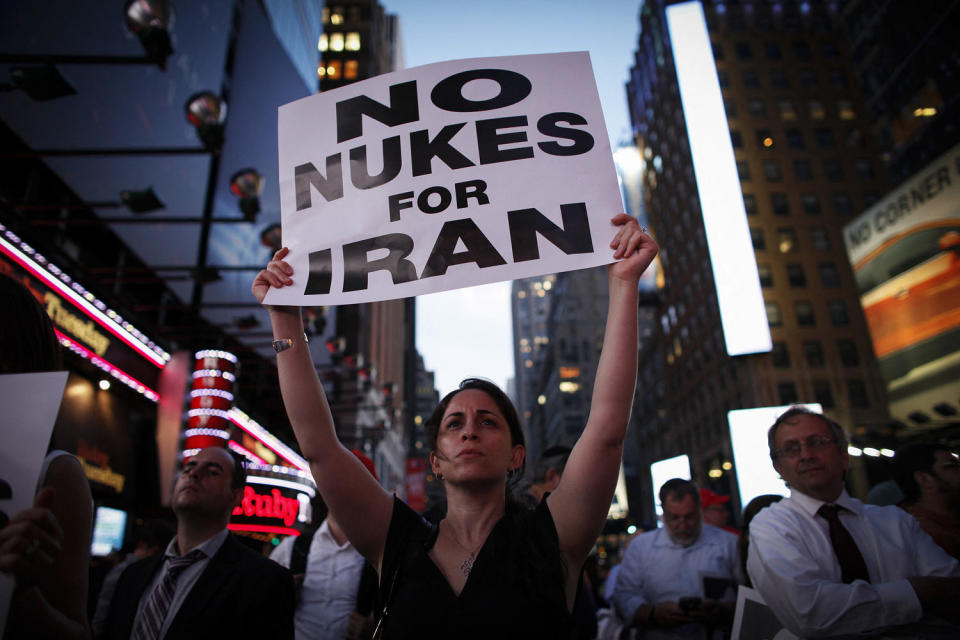Iran’s Supreme Leader Ayatollah Ali Khamenei on Friday rejected the idea of holding talks with the Trump administration, saying that experience had shown it was “not rational, intelligent, or honorable” to do so.
“Negotiations with America do not solve any of our problems,” Khamenei said in a speech Friday, according to the Iranian news agency Tasnim.
Khamenei’s comments came after Trump on Wednesday indicated a willingness to negotiate a nuclear deal with Iran “immediately.” Days earlier, the president renewed his “maximum pressure” campaign on Tehran, signing an executive order aimed at preventing it from obtaining nuclear weapons and eliminating its oil exports.
“We will see whether or not we can arrange or work out a deal with Iran,” Trump said in a post on Truth Social.
“We don’t want to be tough on Iran. We don’t want to be tough on anybody,” he added, expressing a preference for “a Verified Nuclear Peace Agreement, which will let Iran peacefully grow and prosper.”
The comments that Khamenei, 85, made in a speech to air force officers also appeared to contradict his own earlier remarks, in which he left the door open to discussions over whether Iran would be prepared to negotiate with the U.S. over enriching weapons-grade uranium and sanctions on billions of dollars worth of exports.
In recent days, both sides have sent “mixed messages” as to whether they would engage in nuclear talks, said Darya Dolzikova, a research fellow with the proliferation and nuclear policy program at the Royal United Services Institute, a London-based think tank.
“The intention of [the U.S.] engaging in nuclear diplomacy with Iran is certainly a good one. I guess where the challenges come in is, when the rubber really hits the road, what does that actually look like?” she told NBC News in a phone interview.
“We’ll just have to see what that looks like in practice,” Dolzikova added.
Both the White House and the Islamic Republic had this week signaled a change in tone from the first Trump administration, during which he withdrew from a 2015 pact intended to curb Iran’s nuclear program signed by the Obama administration, and reinstated crippling sanctions.
Then-President Barack Obama is flanked by then-Vice President Biden at the White House in 2015 as he announces details of the Iran nuclear deal.
Shortly after, the U.S. withdrew from the deal in 2018, Iran violated the previously agreed-upon enrichment limitations.
But Khamenei pointed to that history Friday, saying that Iran had made “many concessions” with the U.S. in the 2010s, but that in the end, “Americans did not honor the deal.”
“Our government at the time engaged in negotiations, held meetings, had discussions, smiled, shook hands, and built relationships,” he said, adding, “The very person who is now in power tore up the agreement.”
While both European and American officials have since attempted to engage with Iran on the issue of nuclear proliferation, those talks have rarely, if ever, ended with a mutually satisfactory outcome.
Trump’s executive order Tuesday also triggered a response from Iranian Foreign Minister Abbas Araghchi, who told the Iranian news agency Tasmin on Wednesday that “maximum pressure is a failed experience, and repeating it will lead to another failure.”

A woman opposes the U.S. nuclear deal with Iran during a rally in New York’s Times Square in 2015.
Iranian President Masoud Pezeshkian also played down the impact of U.S. sanctions on Iran. On Wednesday, he urged fellow members of the Organization of the Petroleum Exporting Countries (OPEC) to unite against possible U.S. sanctions on the major oil producer, later saying that “Iran is a powerful and resource-rich country that can navigate challenges by managing its resources.”
Iranian officials in recent days have repeatedly claimed the country isn’t actively pursuing a nuclear weapon, reiterating that it is a signatory of the Treaty on the Non-Proliferation of Nuclear Weapons, an international agreement to prevent the spread of nuclear weapons and technology.
While Iran has not yet pursued building a nuclear bomb, a 2023 report released by watchdog International Atomic Energy Agency found the country had begun enriching uranium close to weapons-grade levels.
Speaking at a news conference Tuesday, Trump indicated that the executive order he signed this week was intended to deter Iran from further developing its nuclear capabilities.
“We will once again enforce the most aggressive possible sanctions to drive Iranian oil exports to zero and diminish the regime’s capacity to fund terror throughout the region and through the world,” he said.
Still, despite American efforts to target Iran’s economy, RUSI’s Dolzikova said that the use of sanctions is “probably not as strong of a lever as it will have been four or five years ago,” because the Iranian economy has since adapted to the pressure by expanding its relations with Russia and China.
She added that “if the Trump administration does go after those continued exports to China, as they seem set to do, then that might create additional pressure.”
This article was originally published on NBCNews.com
Read the full article here


